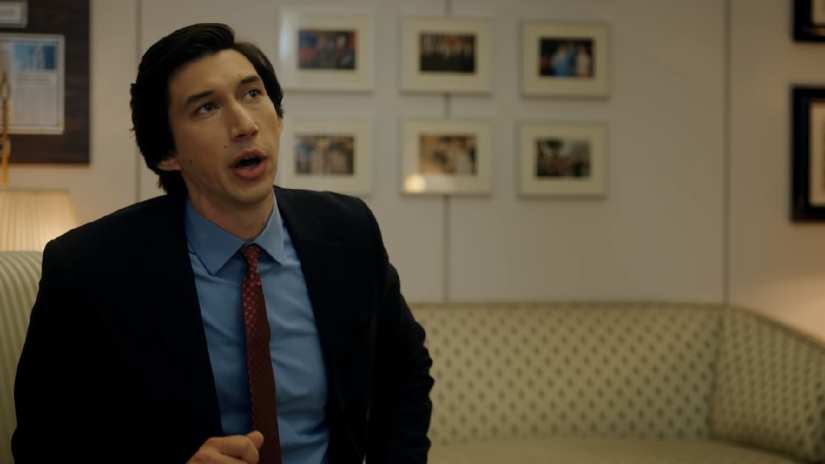Let’s start off with what’s most important: nothing that points out the shortcomings of The Report in this or any other review you read should discourage you from watching the film. For the virtues of Scott Z Burns’ compelling new film far outweigh its flaws because of their sheer humanist and historical urgency. Not unlike its straightforward title and the personality of its protagonist Daniel Jones (Adam Driver), the film is cerebral, focused and obsessed with adherence to facts to reveal the truth. Just like Jones, it seeks to expose the institutional myopia that enabled the torture of detainees in post 9/11 America and the successive administrative attempts to cover it up. America made a grave error. Jones, his boss Senator Diane Feinstein (Annette Bening) and Burns want to ensure it admits its mistake and punishes the perpetrators who committed the wrongs. Driver and Bening lead the fine cast in delivering first rate performances. And as long as Burns sticks to the genesis and the development of the report and steers clear of theatrics and the occasional speechifying, The Report remains an eye opening and rewarding watch. [caption id=“attachment_7426031” align=“alignnone” width=“825”]  Adam Driver in a still from The Report. YouTube screengrab[/caption] In the aftermath of the terrorist attacks on the 11th of September, 2001, The Central Intelligence Agency, United States’ foreign intelligence agency, is provided with abundant resources and power to capture and detain terrorist suspects who could be involved in planning attacks on American soil. The CIA top brass is impressed by a Powerpoint presentation on enhanced interrogation techniques put together by Jim Mitchell and Bruce Jessen, both veterans of the Air Force. These techniques are curated to create debility, dependency and dread—the three D’s, as Mitchell and Jessen call them—in the detainees. The techniques range from sleep deprivation, exposure to loud music and slapping to mock burials. Torture, in short. Torture, that then President Bush insisted, is unlawful. Mitchell and Jessen employ these techniques on hundreds of detainees at black sites like Abu Ghraib and Guantanamo. Feinstein is handed the task of investigating these enhanced interrogation techniques (EITs) as the head of a Senate committee. She asks Jones to head a small team of six people to investigate and come up with a report. Over the next few years, Jones would witness his team size get depleted, agencies refuse to cooperate and get threatened as he goes through millions of pages of officialese to expose the ineffective methods and human abuse that took place under the CIA’s watch in the name of national security. His stoic cool, his commitment to the job at hand and the wider concern for democracy would be tested time and again by multiple institutions hell bent on avoiding looking into the mirror. Burns is cognisant of the raw power of the material in his hands. Right off the bat, he tries to waste as little time as possible to cut to the chase. He rushes through the initial stretches of character development comprising the early stages of Jones’ career to arrive quickly at the genesis of the investigation. The viewer is best advised to ignore them as well. Jones’ personal life, or that of anyone else in the film, receives passing mention. Burns’ characters move from one official vacuum to the next: airless, stuffy and sterile rooms that reflect the extent of their inner lives. The more Jones learns about the EIT program and its failures, the more indignant and desperate for justice he becomes. His bureaucratic heroism, the type that rarely gets mentioned, forget celebrated, comes at a personal, mental cost. Burns’ film would clearly have benefited from a more well rounded approach to Jones’ character. At any rate, The Report is about the report and all the administrative attempts to muzzle it. Everyone from the CIA to the White House is in on it and Jones aka Burns piles up the evidence in the face of mounting skepticism and increasingly furrowed brows. There is even an attempt to shoot the messenger. Burns spends his time switching between piles of paperwork and depicting the harrowing torture that the detainees underwent. He skewers the system that encouraged the use of techniques that yielded zero credible information. Jones soon learns about the devious manner in which the CIA colludes with the White House to attain credibility for these techniques. A tale replete with fabrication and outright lies begins to unfold. But it only serves to strengthen his resolve to make the report public. Burns doesn’t appear to have the patience or the time for dramatic asides or overtures. He presents the unfolding of the report with a documentarians’ integrity and resolve. The real life drama surrounding the report provides more than enough conflict and tension to last the film. So the occasional patriotic speech and preachy aside that Burns succumbs to appears all the more grating and avoidable. It distracts from its earnestness in pulling up a country’s top brass for a grave historical wrong. That apart, The Report is a thoroughly engaging film that is unwavering in its commitment to truth. It bats for the ordinary guy and his capacity to change the course of events simply by doing his job.
The Report bats for the ordinary guy and his capacity to change the course of events simply by doing his job.
Advertisement
End of Article


)
)
)
)
)
)
)
)
)



